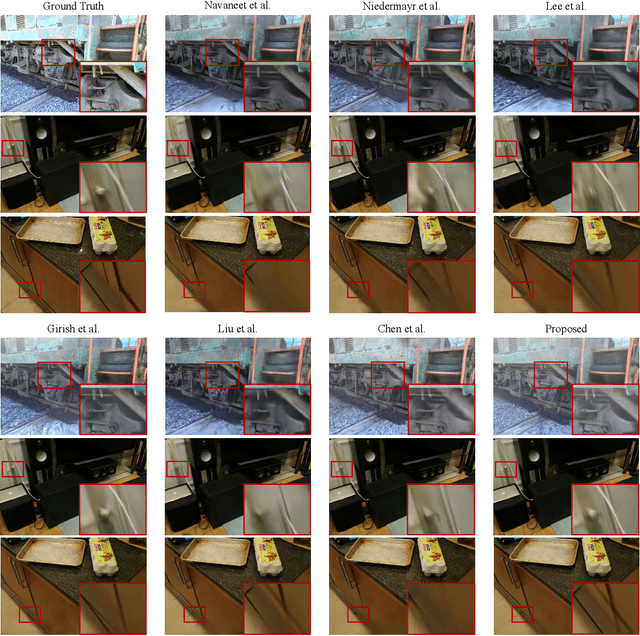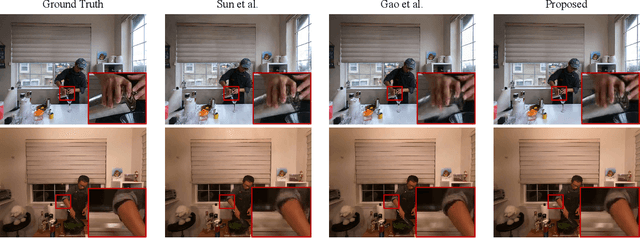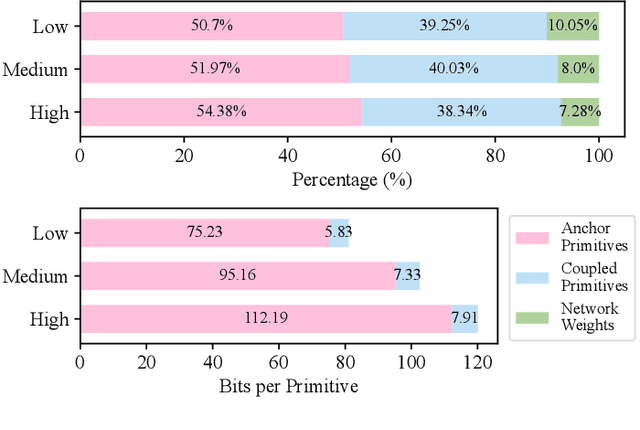Xiangrui Liu
Hi-Light: A Path to high-fidelity, high-resolution video relighting with a Novel Evaluation Paradigm
Jan 30, 2026Abstract:Video relighting offers immense creative potential and commercial value but is hindered by challenges, including the absence of an adequate evaluation metric, severe light flickering, and the degradation of fine-grained details during editing. To overcome these challenges, we introduce Hi-Light, a novel, training-free framework for high-fidelity, high-resolution, robust video relighting. Our approach introduces three technical innovations: lightness prior anchored guided relighting diffusion that stabilises intermediate relit video, a Hybrid Motion-Adaptive Lighting Smoothing Filter that leverages optical flow to ensure temporal stability without introducing motion blur, and a LAB-based Detail Fusion module that preserves high-frequency detail information from the original video. Furthermore, to address the critical gap in evaluation, we propose the Light Stability Score, the first quantitative metric designed to specifically measure lighting consistency. Extensive experiments demonstrate that Hi-Light significantly outperforms state-of-the-art methods in both qualitative and quantitative comparisons, producing stable, highly detailed relit videos.
Can LLMs See Without Pixels? Benchmarking Spatial Intelligence from Textual Descriptions
Jan 07, 2026Abstract:Recent advancements in Spatial Intelligence (SI) have predominantly relied on Vision-Language Models (VLMs), yet a critical question remains: does spatial understanding originate from visual encoders or the fundamental reasoning backbone? Inspired by this question, we introduce SiT-Bench, a novel benchmark designed to evaluate the SI performance of Large Language Models (LLMs) without pixel-level input, comprises over 3,800 expert-annotated items across five primary categories and 17 subtasks, ranging from egocentric navigation and perspective transformation to fine-grained robotic manipulation. By converting single/multi-view scenes into high-fidelity, coordinate-aware textual descriptions, we challenge LLMs to perform symbolic textual reasoning rather than visual pattern matching. Evaluation results of state-of-the-art (SOTA) LLMs reveals that while models achieve proficiency in localized semantic tasks, a significant "spatial gap" remains in global consistency. Notably, we find that explicit spatial reasoning significantly boosts performance, suggesting that LLMs possess latent world-modeling potential. Our proposed dataset SiT-Bench serves as a foundational resource to foster the development of spatially-grounded LLM backbones for future VLMs and embodied agents. Our code and benchmark will be released at https://github.com/binisalegend/SiT-Bench .
Video-BrowseComp: Benchmarking Agentic Video Research on Open Web
Dec 28, 2025Abstract:The evolution of autonomous agents is redefining information seeking, transitioning from passive retrieval to proactive, open-ended web research. However, while textual and static multimodal agents have seen rapid progress, a significant modality gap remains in processing the web's most dynamic modality: video. Existing video benchmarks predominantly focus on passive perception, feeding curated clips to models without requiring external retrieval. They fail to evaluate agentic video research, which necessitates actively interrogating video timelines, cross-referencing dispersed evidence, and verifying claims against the open web. To bridge this gap, we present \textbf{Video-BrowseComp}, a challenging benchmark comprising 210 questions tailored for open-web agentic video reasoning. Unlike prior benchmarks, Video-BrowseComp enforces a mandatory dependency on temporal visual evidence, ensuring that answers cannot be derived solely through text search but require navigating video timelines to verify external claims. Our evaluation of state-of-the-art models reveals a critical bottleneck: even advanced search-augmented models like GPT-5.1 (w/ Search) achieve only 15.24\% accuracy. Our analysis reveals that these models largely rely on textual proxies, excelling in metadata-rich domains (e.g., TV shows with plot summaries) but collapsing in metadata-sparse, dynamic environments (e.g., sports, gameplay) where visual grounding is essential. As the first open-web video research benchmark, Video-BrowseComp advances the field beyond passive perception toward proactive video reasoning.
Object Recognition Datasets and Challenges: A Review
Jul 30, 2025Abstract:Object recognition is among the fundamental tasks in the computer vision applications, paving the path for all other image understanding operations. In every stage of progress in object recognition research, efforts have been made to collect and annotate new datasets to match the capacity of the state-of-the-art algorithms. In recent years, the importance of the size and quality of datasets has been intensified as the utility of the emerging deep network techniques heavily relies on training data. Furthermore, datasets lay a fair benchmarking means for competitions and have proved instrumental to the advancements of object recognition research by providing quantifiable benchmarks for the developed models. Taking a closer look at the characteristics of commonly-used public datasets seems to be an important first step for data-driven and machine learning researchers. In this survey, we provide a detailed analysis of datasets in the highly investigated object recognition areas. More than 160 datasets have been scrutinized through statistics and descriptions. Additionally, we present an overview of the prominent object recognition benchmarks and competitions, along with a description of the metrics widely adopted for evaluation purposes in the computer vision community. All introduced datasets and challenges can be found online at github.com/AbtinDjavadifar/ORDC.
DeepShade: Enable Shade Simulation by Text-conditioned Image Generation
Jul 16, 2025Abstract:Heatwaves pose a significant threat to public health, especially as global warming intensifies. However, current routing systems (e.g., online maps) fail to incorporate shade information due to the difficulty of estimating shades directly from noisy satellite imagery and the limited availability of training data for generative models. In this paper, we address these challenges through two main contributions. First, we build an extensive dataset covering diverse longitude-latitude regions, varying levels of building density, and different urban layouts. Leveraging Blender-based 3D simulations alongside building outlines, we capture building shadows under various solar zenith angles throughout the year and at different times of day. These simulated shadows are aligned with satellite images, providing a rich resource for learning shade patterns. Second, we propose the DeepShade, a diffusion-based model designed to learn and synthesize shade variations over time. It emphasizes the nuance of edge features by jointly considering RGB with the Canny edge layer, and incorporates contrastive learning to capture the temporal change rules of shade. Then, by conditioning on textual descriptions of known conditions (e.g., time of day, solar angles), our framework provides improved performance in generating shade images. We demonstrate the utility of our approach by using our shade predictions to calculate shade ratios for real-world route planning in Tempe, Arizona. We believe this work will benefit society by providing a reference for urban planning in extreme heat weather and its potential practical applications in the environment.
Video-XL-2: Towards Very Long-Video Understanding Through Task-Aware KV Sparsification
Jun 24, 2025Abstract:Multi-modal large language models (MLLMs) models have made significant progress in video understanding over the past few years. However, processing long video inputs remains a major challenge due to high memory and computational costs. This makes it difficult for current models to achieve both strong performance and high efficiency in long video understanding. To address this challenge, we propose Video-XL-2, a novel MLLM that delivers superior cost-effectiveness for long-video understanding based on task-aware KV sparsification. The proposed framework operates with two key steps: chunk-based pre-filling and bi-level key-value decoding. Chunk-based pre-filling divides the visual token sequence into chunks, applying full attention within each chunk and sparse attention across chunks. This significantly reduces computational and memory overhead. During decoding, bi-level key-value decoding selectively reloads either dense or sparse key-values for each chunk based on its relevance to the task. This approach further improves memory efficiency and enhances the model's ability to capture fine-grained information. Video-XL-2 achieves state-of-the-art performance on various long video understanding benchmarks, outperforming existing open-source lightweight models. It also demonstrates exceptional efficiency, capable of processing over 10,000 frames on a single NVIDIA A100 (80GB) GPU and thousands of frames in just a few seconds.
MASLab: A Unified and Comprehensive Codebase for LLM-based Multi-Agent Systems
May 22, 2025Abstract:LLM-based multi-agent systems (MAS) have demonstrated significant potential in enhancing single LLMs to address complex and diverse tasks in practical applications. Despite considerable advancements, the field lacks a unified codebase that consolidates existing methods, resulting in redundant re-implementation efforts, unfair comparisons, and high entry barriers for researchers. To address these challenges, we introduce MASLab, a unified, comprehensive, and research-friendly codebase for LLM-based MAS. (1) MASLab integrates over 20 established methods across multiple domains, each rigorously validated by comparing step-by-step outputs with its official implementation. (2) MASLab provides a unified environment with various benchmarks for fair comparisons among methods, ensuring consistent inputs and standardized evaluation protocols. (3) MASLab implements methods within a shared streamlined structure, lowering the barriers for understanding and extension. Building on MASLab, we conduct extensive experiments covering 10+ benchmarks and 8 models, offering researchers a clear and comprehensive view of the current landscape of MAS methods. MASLab will continue to evolve, tracking the latest developments in the field, and invite contributions from the broader open-source community.
X-MAS: Towards Building Multi-Agent Systems with Heterogeneous LLMs
May 22, 2025



Abstract:LLM-based multi-agent systems (MAS) extend the capabilities of single LLMs by enabling cooperation among multiple specialized agents. However, most existing MAS frameworks rely on a single LLM to drive all agents, constraining the system's intelligence to the limit of that model. This paper explores the paradigm of heterogeneous LLM-driven MAS (X-MAS), where agents are powered by diverse LLMs, elevating the system's potential to the collective intelligence of diverse LLMs. We introduce X-MAS-Bench, a comprehensive testbed designed to evaluate the performance of various LLMs across different domains and MAS-related functions. As an extensive empirical study, we assess 27 LLMs across 5 domains (encompassing 21 test sets) and 5 functions, conducting over 1.7 million evaluations to identify optimal model selections for each domain-function combination. Building on these findings, we demonstrate that transitioning from homogeneous to heterogeneous LLM-driven MAS can significantly enhance system performance without requiring structural redesign. Specifically, in a chatbot-only MAS scenario, the heterogeneous configuration yields up to 8.4\% performance improvement on the MATH dataset. In a mixed chatbot-reasoner scenario, the heterogeneous MAS could achieve a remarkable 47\% performance boost on the AIME dataset. Our results underscore the transformative potential of heterogeneous LLMs in MAS, highlighting a promising avenue for advancing scalable, collaborative AI systems.
CompGS++: Compressed Gaussian Splatting for Static and Dynamic Scene Representation
Apr 17, 2025



Abstract:Gaussian splatting demonstrates proficiency for 3D scene modeling but suffers from substantial data volume due to inherent primitive redundancy. To enable future photorealistic 3D immersive visual communication applications, significant compression is essential for transmission over the existing Internet infrastructure. Hence, we propose Compressed Gaussian Splatting (CompGS++), a novel framework that leverages compact Gaussian primitives to achieve accurate 3D modeling with substantial size reduction for both static and dynamic scenes. Our design is based on the principle of eliminating redundancy both between and within primitives. Specifically, we develop a comprehensive prediction paradigm to address inter-primitive redundancy through spatial and temporal primitive prediction modules. The spatial primitive prediction module establishes predictive relationships for scene primitives and enables most primitives to be encoded as compact residuals, substantially reducing the spatial redundancy. We further devise a temporal primitive prediction module to handle dynamic scenes, which exploits primitive correlations across timestamps to effectively reduce temporal redundancy. Moreover, we devise a rate-constrained optimization module that jointly minimizes reconstruction error and rate consumption. This module effectively eliminates parameter redundancy within primitives and enhances the overall compactness of scene representations. Comprehensive evaluations across multiple benchmark datasets demonstrate that CompGS++ significantly outperforms existing methods, achieving superior compression performance while preserving accurate scene modeling. Our implementation will be made publicly available on GitHub to facilitate further research.
Biomedical Foundation Model: A Survey
Mar 03, 2025Abstract:Foundation models, first introduced in 2021, are large-scale pre-trained models (e.g., large language models (LLMs) and vision-language models (VLMs)) that learn from extensive unlabeled datasets through unsupervised methods, enabling them to excel in diverse downstream tasks. These models, like GPT, can be adapted to various applications such as question answering and visual understanding, outperforming task-specific AI models and earning their name due to broad applicability across fields. The development of biomedical foundation models marks a significant milestone in leveraging artificial intelligence (AI) to understand complex biological phenomena and advance medical research and practice. This survey explores the potential of foundation models across diverse domains within biomedical fields, including computational biology, drug discovery and development, clinical informatics, medical imaging, and public health. The purpose of this survey is to inspire ongoing research in the application of foundation models to health science.
 Add to Chrome
Add to Chrome Add to Firefox
Add to Firefox Add to Edge
Add to Edge